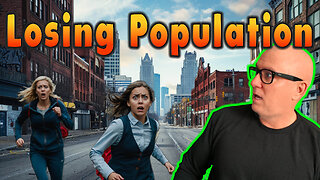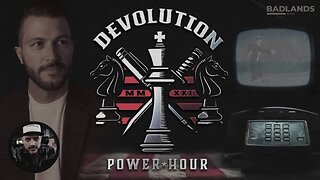Premium Only Content

Stressed Minds - A Critique of Joe Culture
Offers a critique of American culture via Joe Rogan.
1. The Stressed vs. Non-Stressed Mind
The core premise revolves around the difference between a stressed mind (fight-or-flight mode) and a non-stressed mind (creative, open, and imaginative).
Rogan often promotes activities like Brazilian Jiu-Jitsu and physical training as ways to mitigate stress, which can be beneficial. However, associating stress-relief with violence (e.g., watching or participating in fighting sports) may inadvertently reinforce aggression or primitive mental states.
2. The Normalization of Violence
Celebrating violent sports, like UFC or American football, risks reinforcing the association of violence with enjoyment.
This cultural tendency can activate and normalize fight-or-flight responses in the brain, potentially making individuals and society more reactive and confrontational in everyday interactions.
Comparisons to less aggressive sports, like soccer, suggest alternative models of competition that emphasize strategy and teamwork over brutality.
3. The Role of Thought Leaders
Rogan’s influence as a thought leader carries weight, particularly with young audiences. His platform can uplift listeners by sharing pathways to better physical and mental health.
However, thought leaders must be conscious of the potential harm their messages may cause if not fully disambiguated—for example, promoting extreme physical discipline without acknowledging its risks or long-term consequences.
4. Comedy, Catharsis, and Responsibility
Rogan’s emphasis on comedy as a means of catharsis is valid, but comedians often tread the line between levity and harm.
There is value in taking dark topics and making them humorous, but overexposure to such themes may keep audiences focused on negativity rather than uplifting or imaginative ideas.
True comedic artistry lies in finding humor that avoids reinforcing negativity while still being universally enjoyable.
5. The Internet’s Role in Stress
Younger generations are growing up in a hyper-connected world, saturated with stress-inducing online content.
Calls for "safe spaces" reflect a legitimate need for refuge in an overstimulating environment. Adults should recognize this as a reaction to persistent stress rather than dismiss it as over-sensitivity.
Online interactions often amplify aggression and disagreement, modeling poor behavior for younger audiences and perpetuating societal tensions.
6. The Need for Adult Leadership
Society lacks sufficient adult role models who can guide younger generations through the challenges of the internet age.
Adults must model calmness, civility, and thoughtful engagement to help youth navigate an increasingly complex and stressful cultural landscape.
Generational wisdom—tempered by experience and reflection—should be passed down to counterbalance the influence of transient, often sensationalist media.
7. Exercise and the Pursuit of Well-Being
Rogan’s promotion of exercise is commendable, but there is a need to emphasize sustainable practices that avoid long-term harm.
Activities like gymnastics-based calisthenics offer discipline and strength without the physical toll of extreme sports or overtraining.
The broader cultural emphasis should shift toward habits that cultivate health without unnecessary risk.
8. Recognizing the Generational Shift
Younger generations have grown up with the internet as a central influence, shaping their minds and experiences in ways older generations cannot fully understand.
Adults must empathize with these unique challenges while providing guidance rooted in experience and stability.
-
 LIVE
LIVE
AlphaZeroOmega
2 hours agoHalo Rumble Spartans #13 ONE YEAR of CONQUEST celebration | 🚨RumbleTakeover🚨
15 watching -
 7:55
7:55
Talk Nerdy Sports - The Ultimate Sports Betting Podcast
6 hours ago4/27/25 - Sunday Service: Vasil’s 10 Holy Locks & PrizePicks Resurrection 💥🧠
39.6K2 -
 18:15
18:15
World2Briggs
14 hours ago $17.06 earned10 Cities That Are Slowly Emptying Like a Sad Party
61.1K49 -
 11:34
11:34
Mrgunsngear
1 day ago $9.51 earnedSiege Suppressors ROC556 Low Backpressure Silencer Review 🤫
51.7K7 -
 30:57
30:57
Clownfish TV
11 hours agoDisney Drops DEI and Goes PRO-AMERICA?!
58.8K50 -
 17:35
17:35
QNewsPatriot
1 day ago(4/25/2025) | AUDIO CHAT 166 | SG Sits Down w/ Sovereign Radio Founder Scotty Saks: Vaxx Lawsuits and the #NeverAgain Telethon
57.1K20 -
 19:51
19:51
CatfishedOnline
8 hours agoSpouse Sends $50,000 To A Man Who Doesn't Exist 😱
40.6K4 -
 11:59
11:59
ariellescarcella
1 day agoThe Dark Side Of "Queer Joy"
32.5K25 -
 1:12:39
1:12:39
Squaring The Circle, A Randall Carlson Podcast
1 day ago#045 What Are The Structures Beneath The Great Pyramids in Giza? Squaring the Circle: A Randall Carlson Podcast
40.1K8 -
 2:08:05
2:08:05
Badlands Media
1 day agoDevolution Power Hour Ep. 349: Trump’s Geopolitical Gambits, Sports Psyops, and the Regime’s Unraveling
150K113